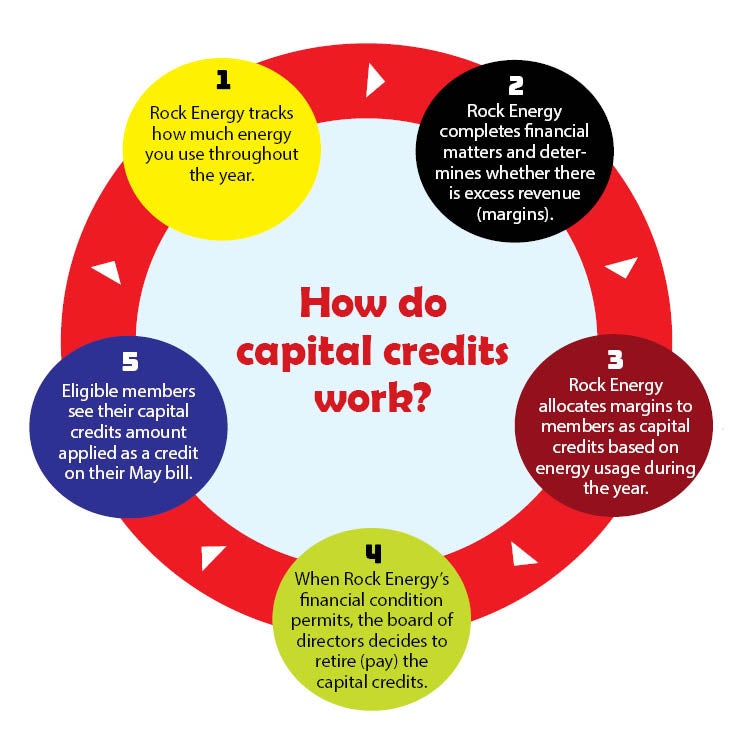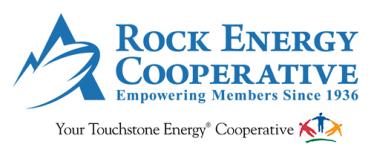Capital credits. Margins. Allocation. Retirement. These concepts are unique to cooperatives, a business model that many people might not fully understand (see below for more information about these terms). Think of it this way—if you use a significant amount of energy per year you get a bigger piece of the cooperative pie. Your piece is reflected on the capital credit allocation notice you receive.
Each eligible co-op member gets a slice based on how much energy they used during the previous year. A residential member whose monthly bill is relatively modest will get a modest slice of the pie. But larger industrial members who pay thousands of dollars each month will receive a bigger piece.
Obviously, that’s an oversimplification, so we encourage you to read the Frequently Asked Questions to get a more thorough understanding of capital credits and how they are distributed.
Members’ economic participation is one of the seven co-op principles and distinguishes energy cooperatives from investor-owned and municipal utilities.
As a co-op member, you get to participate financially in Rock Energy. The amount shown on your statement each May indicates your participation. That money is used as working capital to operate, maintain, and upgrade the cooperative’s energy distribution system.
As a cooperative, we don’t talk about profits because we’re a not-for-profit business. By definition, a cooperative is “an enterprise that is collectively operated for the mutual benefit of its members." These benefits include the generation, accumulation, and possible return of capital credits.
Margins, Allocation & Retirement
What are margins? As a cost-of-service energy provider, Rock Energy doesn’t earn profits. Instead, co-ops use the term margins, which is any remaining balance at the end of the year after all bills are paid. Capital credits reflect each member’s proportional contribution to the cooperative’s equity. This differs from dividends that investor-owned utilities pay shareholders, who may or may not receive service from the utility. All capital credits allocated to the membership are retained (owned) by the cooperative until the board of directors elects to retire (pay out) a portion of capital credits.
What is an allocation? An allocation is your proportional share of the margins. Allocated funds do not sit in a separate account. These funds are invested in the cooperative. Allocated funds remain the cooperative’s funds until they are retired. Only when the board decides to retire capital credits do they become available to the member.
What is a retirement? A retirement is the amount you receive as a credit on your statement, or as a check (if you are a former co-op member). It is a percentage of your allocations. Typically, after utilizing capital for 20 to 30 years, it is retired. Each year, your board of directors decides whether to retire capital credits based on the co-op’s financial health. Rock Energy’s ability to retire capital credits reflects the cooperative’s strength and financial stability.
Co-op Equity
Your contribution towards the co-op’s equity helps reduce the need for us to raise rates or borrow additional money to meet expenses. Co-ops receive their operating funds from two sources: the amount members pay for service and bank loans. Lenders require that co-ops maintain a minimum equity level, which is where capital credits come into play. Equity levels are a measure of financial strength. Higher levels give lenders more confidence that a loan can be repaid and allow them to offer competitive interest rates. Without this equity, members’ rates would be much higher.

What If You Move?
If you move, you should know that your capital credits remain on our books until they are retired. That’s why it’s important to let us know of any address changes. The cooperative retains ownership of all equity, including allocated capital credits, until the board of directors elects to retire a portion of the equity. Co-ops, in part, use the capital credits system to ensure fairness across generations. The equity generated from past members help keep our rates affordable for today’s members. The balance of an individual former member may be small compared to the co-op’s total operating budget, but we have thousands of former members. If every former member asked for and received all their equity today, Rock Energy’s costs would increase, thus impacting rates.
If you have any questions about capital credits, please feel free to contact our member services team at 866-752-4550. Or, you can check out the Capital Credits FAQs.
